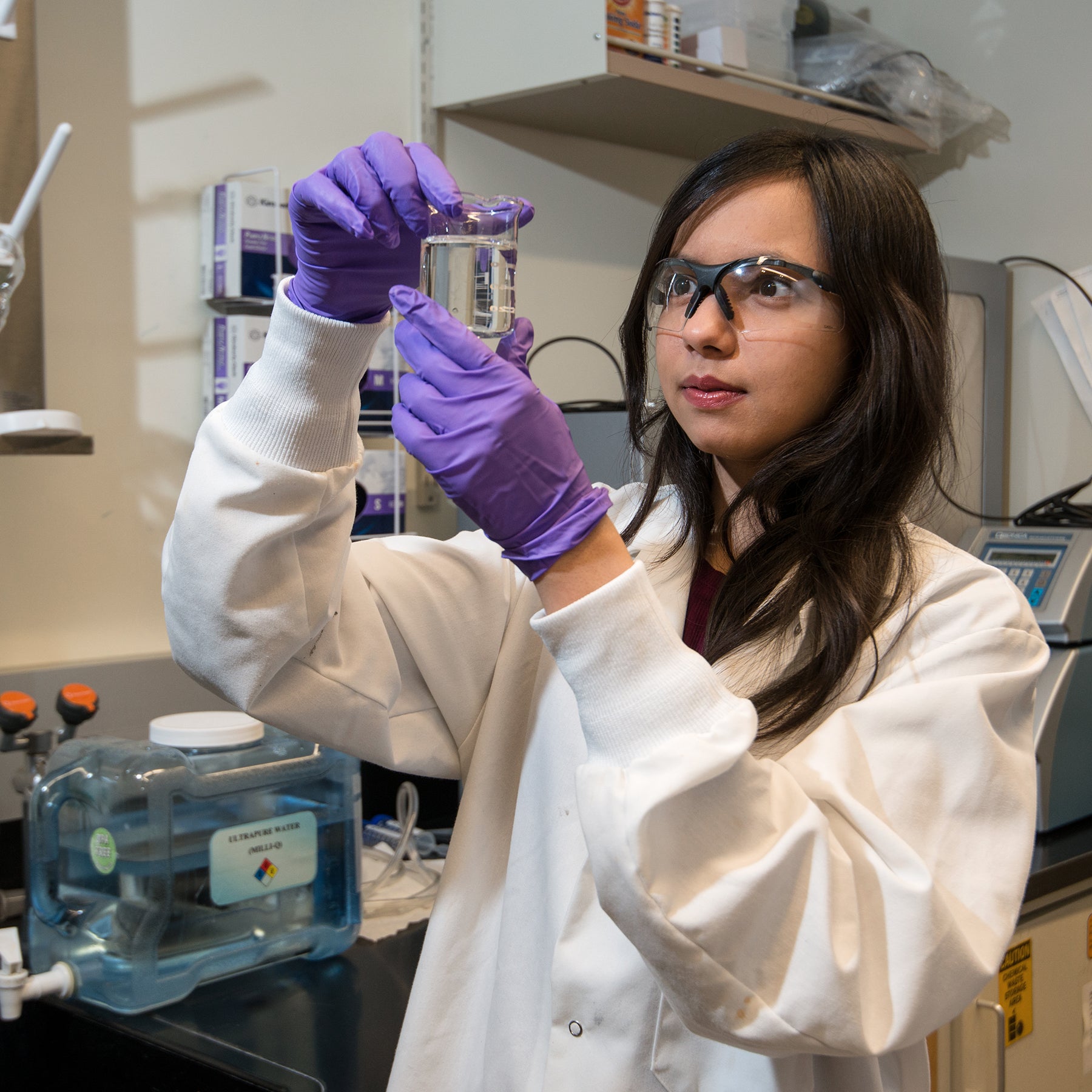
That Naqsh Mansoor is intelligent, curious and driven comes as no surprise – Mansoor was awarded a Fulbright scholarship in her native country of Pakistan to pursue graduate studies in the field of her choice: environmental materials. But it may be surprising to learn that last fall, Mansoor chose to utilize her Fulbright to pursue a master’s degree at Boise State University’s Micron School of Materials Science and Engineering, where she is working hard to develop new, sophisticated water filtration systems.
“We’ve had Boise State students who’ve been awarded Fulbrights in the past, but I believe Naqsh is one of the few Fulbright recipients who’s chosen to come to Boise State to complete her studies,” said David Estrada, an assistant professor in the Micron School and Mansoor’s advisor. “We’re very excited to have her. She’s applying a new class of materials to one of the grand challenges of engineering, which is water security.”
Water filtration systems are designed to “scrub” foreign particles from water. They are employed everywhere, from residential homes to industries like waste water treatment, and new technologies to capture and recycle “used” water grow more urgent as droughts and water shortages affect communities around the globe. A key component of filtration systems are the filters themselves, which often need replacing. Each replacement increases cost while reducing efficiency for the user.
“The current filtration technology is at a standstill because of lack of adequate materials.,” Mansoor explained. “We need a material that doesn’t clog over time or if it does, the clogging is easily reversible. The goal is to create membranes that can improve any of these systems. Not all water filtration systems are the same, but hopefully the membranes can be universal.”
Mansoor is Boise State’s first graduate student to work on improving water filtration systems using two-dimensional (2D) materials to do so. These 2D materials are an emerging class of atomically thin materials that physically confine electrons to two dimensions, leading to unique and exciting physical properties. In particular, Mansoor’s research focuses on the use of MXene’s, which are 2D variants of transition metal carbides, nitrides or carbonitrides. Their discovery was first reported in 2011 by a team at Drexel University.
“Our approach, which is ‘how do we clean that water, recycle that water and repurpose it with those materials?’ is a new angle that we’re trying at Boise State,” Estrada added. “In fact, it’s fairly new globally, using MXenes applied for water purification. The first paper on it was only published in 2017.”
Mansoor and Estrada believe 2D materials have the potential of improving filtration systems by scrubbing foreign particles not by size, but by their electronic charge.
“We’re trying to exploit the electrostatic charge differences of possible pollutants, rather than rely on filtration which relies solely upon size difference,” Mansoor said. “The material we’re looking at, it allows water to pass through but doesn’t even allow helium ions to pass through, and they’re smaller than water molecules.”
Mansoor spent fall semester reading up on others’ research so she could build upon their work. This semester, she has been busy in the lab, working on synthesizing membranes for potential filters. Not only must the filters be degrade-resistant and mechanically and environmentally stable, she also must ensure that they are non-toxic.
“Part of my job is to analyze the environmental effects of passing water through these membranes,” she said.
Water conservation has been Mansoor’s passion for a long time. “It is the thing that is ultimately the most connected with life,” she noted. “We as a human race haven’t been very mindful of it, we’ve polluted seas and rivers, and it’s destroyed whole ecological systems. Whole parts of the world are becoming water stressed and it’s only going to get worse in the future.”
“If her research is successful and we can build industrial-scale membranes for use, it could reduce costs for water filtration and have a big effect on industrial processing, which has a lot of heavy metal contaminants. It could potentially make that water safe for drinking, while also allowing us to recover critical elements from electronic waste” Estrada added.
